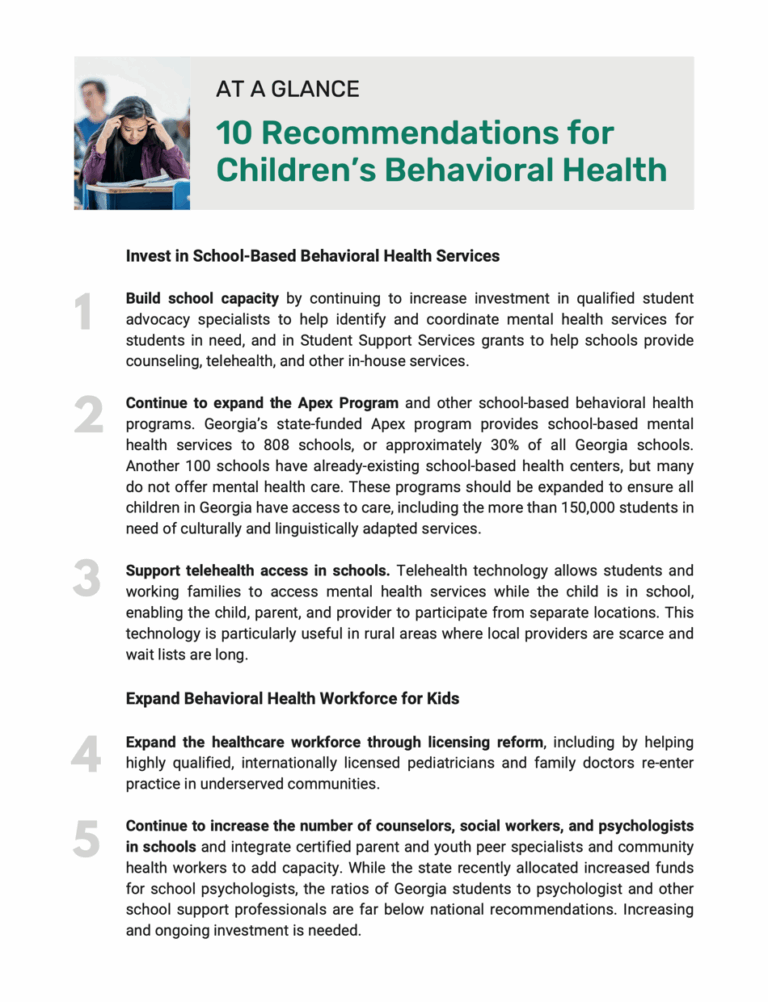10 Policy Recommendations for Behavioral Health
Invest in School-Based Behavioral Health Services
10 Recommendations for Children’s Behavioral Health
1. Build school capacity by continuing to increase investment in qualified student advocacy specialists to help identify and coordinate mental health services for students in need, and in Student Support Services grants to help schools provide counseling, telehealth, and other in-house services.
2. Continue to expand the Apex Program and other school-based behavioral health programs. Georgia’s state-funded Apex program provides school-based mental health services to 808 schools, or approximately 30% of all Georgia schools. Another 100 schools have already-existing school-based health centers, but many do not offer mental health care. These programs should be expanded to ensure all children in Georgia have access to care, including the more than 150,000 students in need of culturally and linguistically adapted services.
3. Support telehealth access in schools. Telehealth technology allows students and working families to access mental health services while the child is in school, enabling the child, parent, and provider to participate from separate locations. This technology is particularly useful in rural areas where local providers are scarce and wait lists are long.
4. Expand the healthcare workforce through licensing reform, including by helping highly qualified, internationally licensed pediatricians and family doctors re-enter practice in underserved communities.
5. Continue to increase the number of counselors, social workers, and psychologists in schools and integrate certified parent and youth peer specialists and community health workers to add capacity. While the state recently allocated increased funds for school psychologists, the ratios of Georgia students to psychologist and other school support professionals are far below national recommendations. Increasing and ongoing investment is needed.
6. Streamline Medicaid and private insurance billing. Outdated Medicaid reimbursement rates and complex billing processes discourage provider participation in school-based behavioral health services. Updating the rates, streamlining billing, and offering guidance for private insurance reimbursement would expand access to in-school services.
7. Enforce mental health parity. Since the enactment of the Georgia Mental Health Parity Act (H.B. 1013) in 2022, Georgia has required that all insurers cover mental health care to the same extent as medical care, but implementation has been inconsistent. To ensure Georgia children and families can access quality mental health care, Georgia should continue to build on the success of the Act and educate consumers about mental health parity and how to report parity violations.
8. Increase school participation in evidence-based behavioral threat assessment and management programs (BTAM). BTAM is a proven, evidence-based approach to responding to threats in schools, that prevents violence by assessing the seriousness of alleged threats and providing students with appropriate discipline and any appropriate services and supports. Only a fraction of Georgia schools has taken the free BTAM training offered by the state, and increased incentives are needed to improve participation.
9. Ensure that mental health and special education specialists are part of the BTAM process. Children with mental health conditions or developmental disabilities are disproportionately disciplined in schools, including for typical behaviors of their disability, that are perceived as threatening or disrespectful. Lawmakers should amend legislation to require that a mental health and special education specialist be part of any BTAM team.
10. Launch a public education campaign for students and parents. The state should partner with youth and nonprofit organizations to educate parents and students about mental health issues and how to access care, including by raising awareness of the 988 Suicide and Crisis Line and schools’ new anonymous reporting systems to prevent suicide and violence. There is also an immediate opportunity to educate Georgia families on the evidence-base of BTAM and incorporate public feedback into the progra

